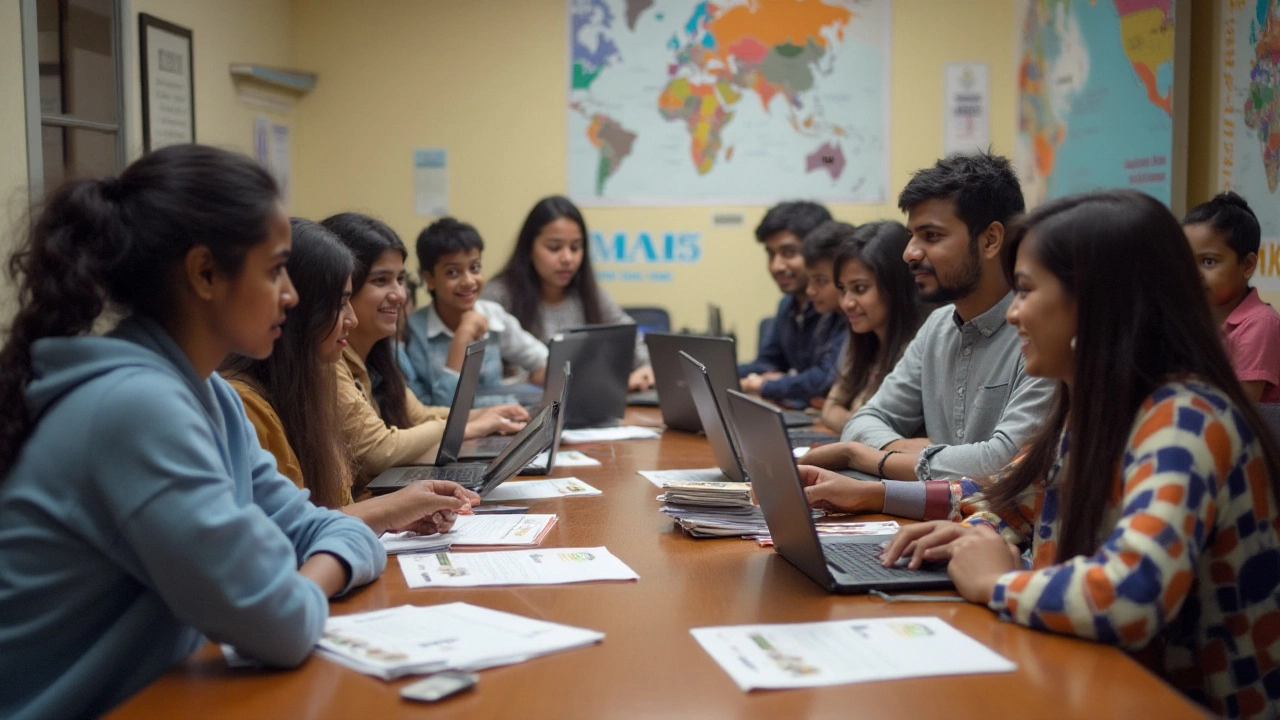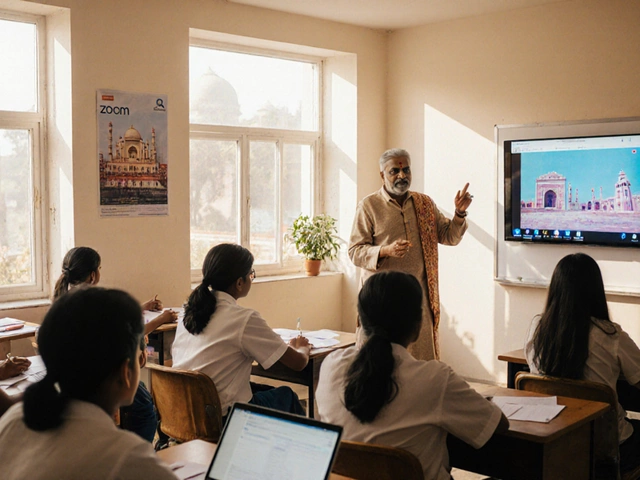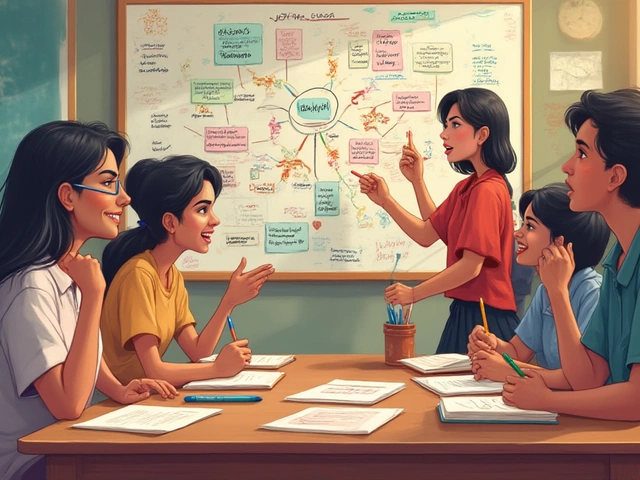Dec
18

- by Dhruv Ainsley
- 0 Comments
Every year, countless students set their sights on achieving educational dreams that are often realized with the support of scholarships. These financial aids can mean the difference between merely dreaming of higher education and making it a reality. However, the journey to securing a scholarship frequently begins with conquering the scholarship exams — a vital component in the selection process.
Diving into this topic, we'll uncover the main scholarship tests that students across the globe prepare for, helping future applicants understand the opportunities available and the requirements they need to meet. This guide not only highlights these exams but also offers tips and strategies to enhance one’s chances of securing a much-coveted scholarship.
- Overview of Prominent Scholarship Exams
- Key Features and Requirements
- How to Prepare for Scholarship Tests
- Common Challenges Students Face
- Tips for Successful Scholarship Applications
Overview of Prominent Scholarship Exams
Embarking on the hunt for scholarships often begins with delving into the diverse world of scholarship exams available worldwide. These exams serve as gateways to education funding, allowing students to access financial aid and pursue higher education dreams. The array of options might seem overwhelming, but understanding the most prominent exams can provide a strategic advantage.
One of the most renowned scholarship exams is the Fulbright Scholarship Program, operating in over 160 countries. Sponsored by the U.S. government, this program attracts aspiring graduates seeking to study in the United States. Its comprehensive selection process evaluates not only academic excellence but also the potential impact of studies on the student's home community. In a similar vein, the Commonwealth Scholarships cater to students from Commonwealth nations, offering full tuition fees and other allowances for those pursuing master's and doctoral studies in the UK.
Another highly sought-after scholarship exam is the Chevening Scholarship, which is aimed at emerging leaders from around the world wishing to pursue a one-year master's degree in the UK. The selection criteria place a significant emphasis on leadership qualities and a clear vision for future professional aspirations. For many, the Rhodes Scholarship remains the gold standard, offering recipients the chance to study at the University of Oxford. Securing this scholarship requires an outstanding academic record coupled with a commitment to making a significant societal impact.
Moreover, the DAAD Scholarships in Germany have been a beacon for international students aiming to enhance their academic pursuits in Germany’s renowned institutions. This scholarship primarily focuses on students from developing countries, offering diverse fields of study and supporting academic exchange. Notably, statistics from recent years demonstrate that Germany attracts over 300,000 international students, with DAAD being a major contributor to this influx.
A noteworthy mention must also be the Erasmus Mundus Joint Master Degrees, co-funded by the Erasmus+ Programme of the European Union. These scholarships are designed for students looking to enroll in prestigious joint master's programs across two or more countries, emphasizing multicultural and international education experiences. A glance at the numbers from the European Commission shows a consistent increase in awarded scholarships, surpassing 4,000 annually, reflecting the growing appeal of European education.
These scholarship exams are not merely tests of academic abilities but markers of potential, leadership, and a desire to contribute positively to society. As Mahatma Gandhi once said,
“The best way to find yourself is to lose yourself in the service of others.”Hence, these programs aren't just educational opportunities but investments in the leaders of tomorrow. Understanding these options can steer aspirants in the right direction, aligning their academic goals with the skills these exams seek to nurture.
Key Features and Requirements
Grasping the key features and requirements of prominent scholarship exams is like chiseling away at a block of stone to reveal a magnificent statue. It's all about understanding the fine details that can make or break an application. From eligibility criteria to specific subjects tested, these features are as unique as the programs they belong to. For example, the Rhodes Scholarship, one of the most prestigious academic awards worldwide, seeks candidates with exceptional intellect, character, leadership, and commitment to service, pushing students beyond mere academic excellence.
Eligibility often extends beyond academic performance. Many scholarships consider extracurricular involvement, leadership roles, community service, and personal achievements. This comprehensive assessment ensures candidates are well-rounded individuals poised to contribute positively to society. In contrast, the Fulbright Program, renowned for its cultural exchange opportunities, also requires language proficiency and an in-depth project proposal. These tests aren't just scanning for intelligence; they're scouting for potential, ambition, and the ability to cross cultural boundaries.
The nature of these exams can be as varied as their requirements. Some operate through essay submissions, whereas others might involve personal interviews, aptitude assessments, or even in-depth research proposals. For instance, the Gates Cambridge Scholarship places emphasis on the "fit" between the applicant and what they aim to study, marrying personal aspirations with academic pursuits. This alignment between subject and student can influence selection significantly.
Testing conditions, too, are an essential factor. Some scholarship exams necessitate travel to designated testing centers, while others have embraced online formats, facilitating global participation. This shift towards digital exams is a burgeoning trend, opening doors for more students regardless of geographical limitations. This technology-driven approach not only democratizes access but also introduces new preparatory strategies focusing on time management and digital literacy.
Interesting insights arise when you explore how specific scholarships prioritize certain skills over others. For example, the IMF Youth Essay Competition leans heavily into economic insight, requiring contestants to propose innovative solutions to real-world economic problems. Such specialized exams demand pre-existing expertise and passion for the field, underscoring the importance of aligning one's interests with scholarship requirements. As you navigate these requirements, remember what American author Jim Rohn famously said:
"Success is not to be pursued; it is to be attracted by the person you become."

How to Prepare for Scholarship Tests
Preparing for scholarship exams demands a strategic approach to ensure success. First, familiarize yourself with the specific test you are aiming for, as each has its unique structure. This can range from subject-specific questions to comprehensive evaluations of general knowledge, analytical skills, and language proficiency. One of the best initial steps is to gather detailed information about the test format, including the types of questions, duration, and scoring methodology. With this information, you'll be better equipped to tailor your study plan effectively, converting anxiety into preparation-driven confidence.
Creating a study schedule is crucial. Allocate ample time for each subject or section, ensuring you cover all aspects of the exam comprehensively. Start your preparation well in advance to avoid last-minute cramming. This also allows you time to delve deeply into each topic, making your understanding and knowledge retention more robust. Numerous free online resources and practice tests are available for popular exams, harnessing these can significantly aid your preparation. Consistent practice using these tools can uncover your strengths and weaknesses, allowing you to refine your study strategy accordingly.
Practicing past papers is often touted as one of the most effective preparation techniques. This practice not only familiarizes you with the question patterns but also helps improve your time management skills, a vital aspect of excelling in scholarship tests. Investing time in mock tests under exam conditions can mark a substantial difference in your preparation quality. It simulates the real testing environment, reducing anxiety and boosting confidence when the actual exam day arrives. Remember, every practice session is an opportunity to better understand the nuances of the exam you're aiming for.
Don’t underestimate the power of a support network. Join study groups or forums online where aspiring scholars gather to share insights and resources. Discussions in such communities provide not just academic support but also moral encouragement, especially as exam day approaches. Having peers in your corner who understand your goals can be incredibly reassuring. Likewise, leveraging these networks can expose you to different perspectives and strategies that you may not have considered independently. According to educational psychologist Penelope Tinkerman, “Collaborative learning environments frequently lead to better outcomes due to the diversity of problem-solving approaches that come into play.”
While studying hard is essential, studying smart is just as crucial. Emphasize the importance of breaks and relaxation. A burnt-out brain is far less efficient, so practicing mindfulness techniques or indulging in physical activities can positively affect your learning process. Balance is key. Multitasking with downtime and focused study phases boosts your cognitive function and overall well-being. Having a well-rounded routine can substantially improve your study efficacy and mental alertness, allowing you to tackle scholarship exams head-on with a fresh and prepared mind.
Common Challenges Students Face
Embarking on the journey of preparing for scholarship exams can often feel like a labyrinth for many students. This path, although rewarding, presents a spectrum of challenges that demand both strategic thinking and adaptability. The sheer breadth of the curriculum is often daunting, with exams designed to test not only textbook knowledge but also analytical skills and problem-solving abilities. Many students find themselves grappling with time management, balancing their regular study schedule with the added pressure of scholarship preparation. The fear of missing out on essential topics while spreading themselves too thin is a constant companion in this academic marathon.
Moreover, the psychological toll cannot be underestimated. For numerous candidates, these exams represent more than just academic achievement; they carry the hopes of opening doors to international scholarships and brighter futures. The stakes feel incredibly high, often leading to stress and anxiety. The competitive nature of these exams, with limited seats and scholarships available, adds another layer of tension. Understanding this, educators and counselors take proactive steps to address these concerns, promoting mental well-being and resilience as integral parts of preparation.
Beyond content mastery, students face the challenge of navigating the administrative aspects of scholarship applications. Each scholarship comes with its own set of criteria, deadlines, and documentation requirements, which can bewilder even the most organized individuals. Missing a single piece of information can jeopardize an entire application, which raises the importance of meticulous attention to detail. Students frequently express frustration over understanding and adhering to these varying guidelines across institutions.
"Education is not preparation for life; education is life itself." — John Dewey
Access to resources and guidance can further complicate this journey. Not all students have equal opportunities when it comes to preparatory materials or mentorship. Those from underrepresented or marginalized communities might encounter additional barriers, lacking access to quality coaching or digital tools that can enhance learning. This inequality in preparation can be a significant hurdle, affecting performance and overall outcomes in these scholarship exams.
Data on Student Challenges
| Challenge | Percentage of Students Affected |
|---|---|
| Curriculum Overload | 45% |
| Stress and Anxiety | 60% |
| Administrative Confusion | 30% |
| Resource Access | 35% |
In navigating these myriad challenges, successful students often stand out by their ability to develop robust strategies. These include creating structured study timetables, seeking support from mentors and peers, and cultivating perseverance in the face of setbacks. Recognizing their own limitations and seeking help proactively is a key trait of those who overcome the hurdles of scholarship test preparation. As educational institutions continue to evolve, there is hope that they will increasingly tailor their support systems to address and alleviate these challenges, ultimately fostering a more equitable environment for all aspiring scholars.

Tips for Successful Scholarship Applications
Embarking on the path to secure a scholarship via exams can feel daunting, yet with the right tips and strategies, you can enhance your chances of success. Firstly, begin by thoroughly researching scholarship exams that align with your academic goals and interests. There are numerous types worldwide, each with unique criteria and eligibility requirements. Understanding these elements helps in crafting applications that resonate well with the selectors. Pay close attention to the deadlines, as these dates vary significantly, and missing one could mean waiting for a whole year to reapply.
Once you have chosen your scholarship options, focus on aligning the application with their values and objectives. It's crucial to highlight your achievements and goals that mirror what the scholarship stands for. For instance, if applying for a study abroad program, emphasize experiences that showcase your adaptability and cultural sensitivity. Tailor each application thoughtfully — generic submissions are evident and often overlooked in favor of those that reflect a personalized touch.
Preparation is vital for success in scholarship exams. Obtaining previous years' papers or sample questions can provide insight into the exam pattern and difficulty level. Regular practice aids in time management and improves problem-solving speed. Consider forming study groups, as collaborative learning often unearths perspectives and solutions you might not have encountered independently. Additionally, many prestigious exams have preparation resources and workshops; taking advantage of these can significantly bolster your knowledge and confidence.
"The secret to scholarship success isn't just the marks on paper, but the mark you make as an individual." - Helena Lam, Educational Advisor at Global Scholars
Additionally, crafting a compelling personal statement is often a pivotal aspect of scholarship applications. This is your opportunity to present your story, aspirations, and what makes you a standout candidate. Be honest yet ambitious. Use your unique voice and weave a narrative that reflects sincerity, ambition, and clarity of purpose. A well-crafted statement can make a considerable difference and leave a lasting impression on the judging panel.
Consider backing your application with strong letters of recommendation. Choose recommenders who know your work ethic, character, and achievements well. They should be able to provide a detailed and positive perspective of your capabilities. Guide them by discussing your future goals and any specific skills or attributes you'd like them to emphasize. This collaboration can ensure a more robust recommendation that aligns with your scholarship application.
Finally, don't underestimate the power of feedback. Before submitting any application, have it reviewed by a mentor, teacher, or advisor. They can offer valuable insights and potentially identify areas for improvement you hadn't noticed. Sometimes, minor adjustments and feedback can elevate an application from good to outstanding. Just keep refining, and stay committed to pursuing the education and international scholarships you dream of.





